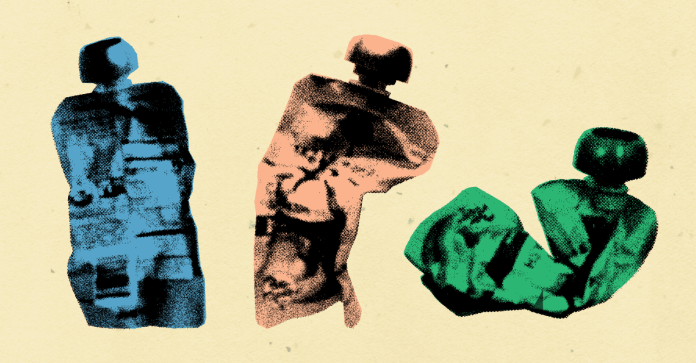On Sunday evening, I fed a bowl of salmon, broccoli, and rice to my eight-month-old son. Or rather, I attempted to. The fish went flying; greens and grains splattered across the walls. Half an hour later, bedtime drew near, and he hadn’t eaten a thing. Exasperated, I handed him a baby-food pouch—and he inhaled every last drop of apple-raspberry-squash-carrot mush.
For harried parents like myself, baby pouches are a lifeline. These disposable plastic packets are sort of like Capri-Suns filled with blends of pureed fruits and vegetables: A screw-top cap makes for easy slurping, potentially even making supervision unnecessary. The sheer ease of baby pouches has made them hyper-popular—and not just for parents with infants who can’t yet eat table food. They are commonly fed to toddlers; even adults sometimes eat baby pouches.
But after my son slurped up all the goo and quickly went to sleep, I felt more guilty than relieved. Giving him a pouch felt like giving up, or taking a shortcut. No parent has the time or energy to make healthy, homemade food all the time, but that doesn’t stop Americans from still thinking “they need to try harder,” Susan Persky, a behavioral scientist at the NIH who has studied parental guilt, told me. That can leave parents stuck between a pouch and a hard place.
Baby pouches have practically become their own food group. These shelf-stable time-savers debuted in 2008, and now come in a staggering range of blends: Gerber sells a carrot, apple, and coriander version; another, from Sprout Organics, contains sweet potato, white bean, and cinnamon. Containing basically just fruits and veggies, pouches are generally seen as a “healthy” option for kids. A 2019 report found that the product accounts for roughly a quarter of baby-food sales. Around the same time, a report on children attending day care showed that pouches are included in more than a quarter of lunch boxes, and some kids get more than half their lunchtime nutrition from them.
But pouches should be just a “sometimes food,” Courtney Byrd-Williams, a professor at the University of Texas’s Houston School of Public Health, told me. When you stack up their drawbacks, relying on them can really start to feel dispiriting. Although pouches are generally produce-based, they tend to have less iron than fortified cereal does and more added sugars than jarred baby food. Excess sweetness may encourage kids to eat more than necessary and could promote a sweet tooth that could later contribute to diet-related chronic disease.
If consumed in excess, pouches may also get in the way of kids learning how to eat real food. Unlike jarred baby food, which tends to contain a single vegetable or several, pouches usually include fruit to mask the bitter with the sweet. “If we’re only giving them pouches,” Byrd-Williams said, “are they learning to like the vegetable taste?” And because the purees are slurped, they don’t give infants the opportunity to practice chewing, potentially delaying development. In 2019, the German Society for Pediatrics and Adolescent Medicine went so far as to issue a statement against baby pouches, warning that eating them may delay eating with a spoon or fingers.
And then, the scariest scenario: Earlier this month, the CDC reported that hundreds of kids may have lead poisoning from pouches containing contaminated applesauce. Perhaps more troubling, a recent analysis by Consumer Reports found that even certain pouches on the market that weren’t implicated in the contamination scandal also contain unusually high levels of lead.
Naturally, these concerns can make parents anxious. Online, caregivers fret that their reliance on the products might leave their child malnourished. Some worry that their kid will never learn how to eat solid food or figure out how to chew. Pouches, to be clear, are hardly a terrible thing to feed your kid. They can be a reliable way to get fruits and vegetables into picky kids, offering a convenience that is unrivaled.
But pouch guilt doesn’t stem entirely from health concerns. By making parenting easier, they also are a reminder of what expectations parents aren’t meeting. I wanted to be the kind of mom who would consistently make my son home-cooked food and persevere through a tough meal, but on Sunday, I was just too exhausted. Guilt is a fact of life for many parents. Virtually anything can trigger it: going to work, staying at home, spending too much time on your phone, not buying supersoft bamboo baby clothes. If parents can have unrealistic standards about it, it’s fair game. “There’s just a lot of guilt about what parents should be doing,” Byrd-Williams said.
But feeding children is especially fraught. Parents are often told what they should feed their children—breast milk, fresh produce—but never how to do so; they’re left to figure that out on their own. About 80 percent of mothers and fathers experience guilt around feeding, Persky told me—about giving their kids sugary or ultra-processed foods or caving to requests for junk. Guilt might be an impetus for better food choices, but Persky said she has found the opposite: Parents who are made to feel guilty about the way they feed their kids end up choosing less healthy foods. “It’s hard to parent when you’re struggling with self-worth,” she said.
Pouch guilt has less to do with the products themselves and more to do with what they represent: convenience, ease, a moment of respite. Asking for a break conflicts with the core expectations of American parenthood, particularly motherhood. At every turn, parents are pressured to do more for their kids; on social media, momfluencers tout home-cooked baby food and meticulously styled birthday parties. The American mentality is that the “moral and correct way to do things is to have infinite willpower,” Persky said, and in this worldview, “shortcuts seem like an inherently bad thing.” Raising children is supposed to be about hard work and self-sacrifice—about pureeing carrots at home instead of buying them in a plastic packet. But when parents are constantly short on time, sometimes the best they can do is scrape together as much as they can, one squeeze pouch after another.
Source link
Yasmin Tayag












